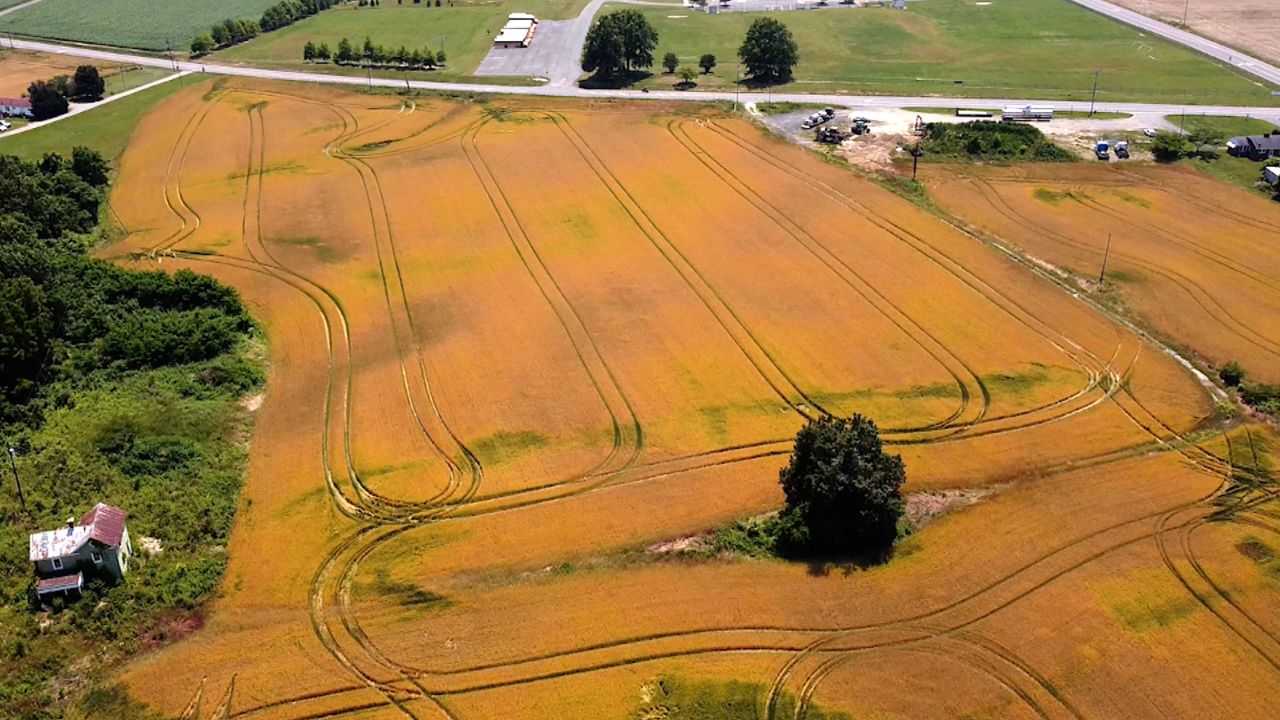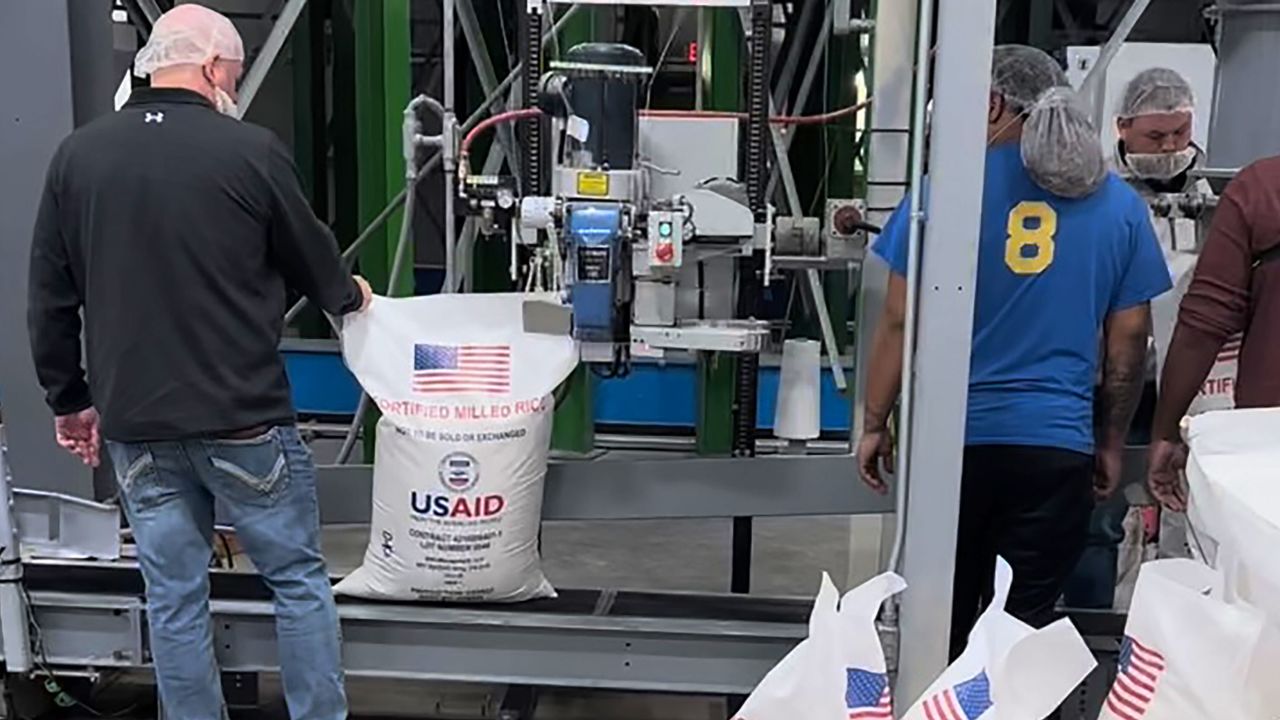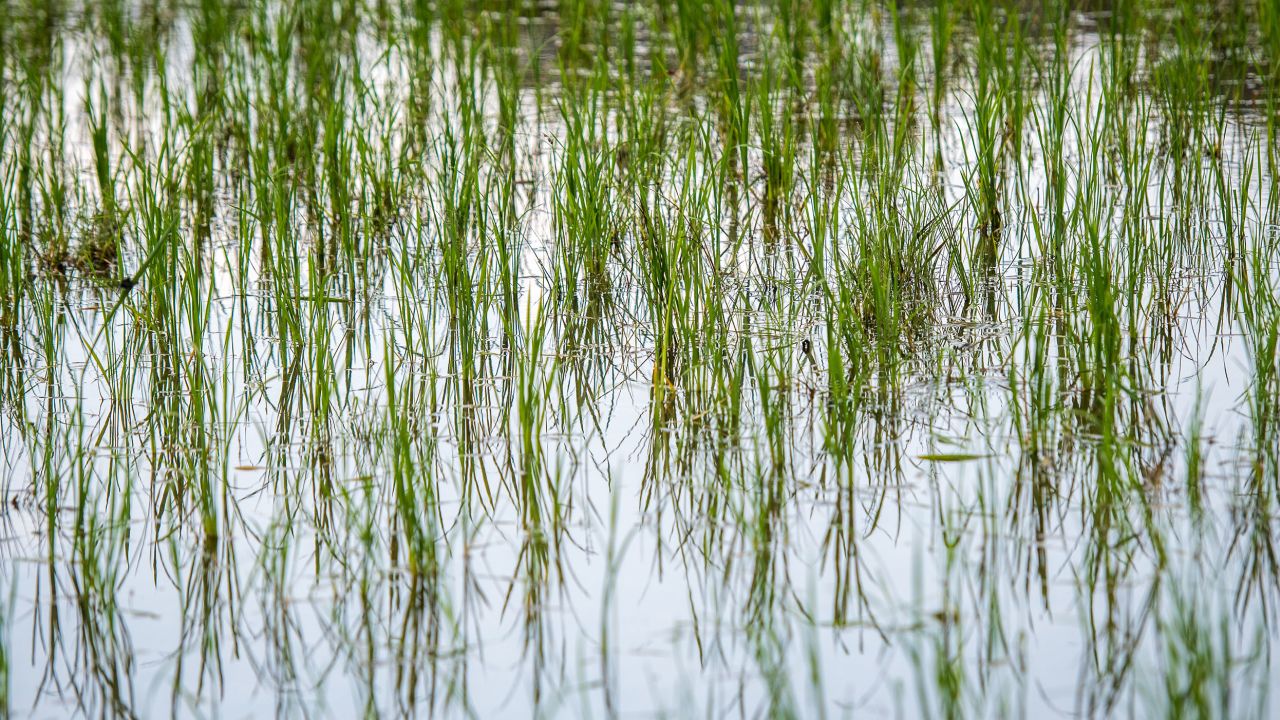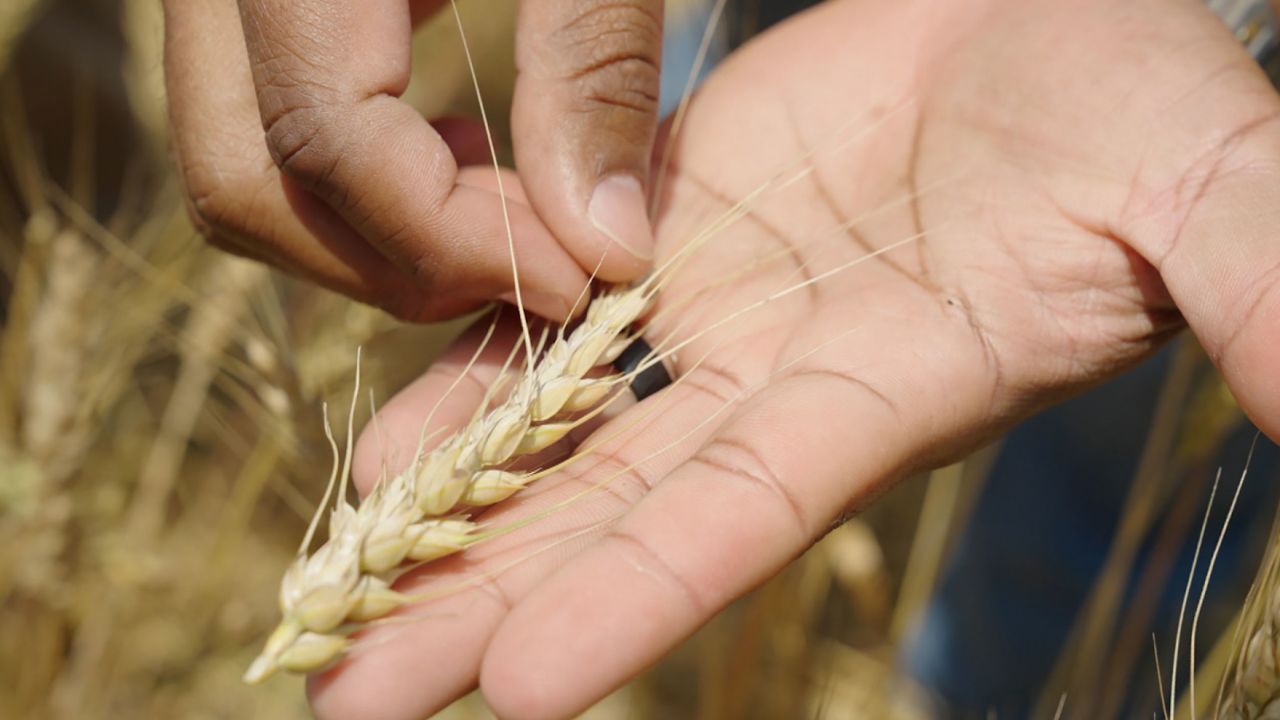
[ad_1]
Northumberland County, Virginia
CNN
—
On a regular basis when PJ Haynie wakes up, he prays to God for 2 issues.
“As farmers, we exit and as they are saying, we plant and pray,” Haynie mentioned. “We plant a crop … we pray for rain; we pray for costs.”
It’s a scorching Saturday morning and Haynie is sitting on the porch of his household’s farming workplace in Heathsville, Virginia. For years, he has prayed over his enterprise of crops right here and a big rice mill, Arkansas River Rice, that his household co-owns greater than a thousand miles away in Pine Bluff, Arkansas.
The household’s ties to land in Northumberland County, Virginia – and to farming – stretch again generations; again to when their ancestors had been enslaved and compelled to farm to gas the American financial system.
However now, Haynie mentioned his household’s story has come full circle and he’s utilizing these generations of agricultural information to proceed their legacy of feeding others, each at house and overseas.
The load of his ancestors’ sacrifices hit the 45-year-old farmer arduous, as he spoke to CNN.
“I teared up at some point as a result of I believed, ‘My ancestors got here from Africa as slaves. I’ve been blessed with the flexibility to know how you can develop crops and develop meals right here in America … and now we’re delivery rice again to Africa to assist feed (the youngsters) of my ancestors.’”
“It was a really emotional second for me,” Haynie mentioned.
In accordance with the household, in 1867, Robert Haynie, free of slavery, bought 60 acres of land in Northumberland County, Virginia. That land has been handed down inside the Haynie household for greater than 150 years.

The Haynie household additionally has farming operations in Arkansas, the place they develop rice, wheat, soybeans and corn. And when a chance got here to broaden the household enterprise by buying an industrial rice mill within the state, Haynie mentioned he “stepped out on religion.”
In December 2021, PJ Haynie, alongside along with his father, Philip (Ricky) Haynie II, and their enterprise accomplice purchased the Arkansas River Rice mill.
“My grandfather can be rolling in his grave if he might see what we’re doing now,” Haynie mentioned. “The one possibility he had was hauling [crops] 5 miles down the highway and promoting it to Perdue Farms or Southern States again then.”
As many nations endure meals insecurity – exacerbated by the conflict in Ukraine – the US has stepped as much as meet the elevated world want for agriculture merchandise like rice, Daniel Whitley, Overseas Agricultural Service administrator for the US Division of Agriculture, informed CNN.
“At any time when there’s a disaster, American agriculture is at all times one of many first to be referred to as upon and one of many first to reply and this example has been no completely different,” Whitley mentioned.
“The conflict in Ukraine has led to a rise in meals safety considerations, and plenty of of these nations are enthusiastic about discovering various sources for merchandise they could have gotten out of that area of the world.”
The Haynie household is hoping their rice mill may be counted amongst these various sources.
In 2022, the US exported $1.7 billion (2 million metric tons) of rice, in response to the USDA. That grain is produced primarily in 4 areas, together with components of the Gulf Coast and California’s Sacramento Valley.
Arkansas, the place the Haynie’s rice mill is situated, produces essentially the most rice of any state within the nation and Arkansas River Rice is among the few Black-owned mills within the US.

By creating extra export alternatives for farmers of coloration, Whitley mentioned the USDA additionally hopes to spice up inclusivity in its packages and scale back inequality.
Many Black-owned agriculture companies and Black farmers, Whitley added, haven’t had the chance to export their merchandise overseas on the size the Haynie household has, which makes the Arkansas River Rice mill uncommon.
That’s one thing PJ Haynie mentioned he takes pleasure in, and he hopes to go that pleasure all the way down to the following era of Haynie farmers.
Arkansas River Rice can course of 22 metric tons of rice in an hour, which Haynie informed CNN is the equal of an 18-wheel tractor trailer stuffed with rice. A 12 months after opening, the corporate secured two contracts from the USDA’s Overseas Agricultural Service to export rice internationally for humanitarian help, he mentioned.
Arkansas River Rice has shipped a whole bunch of metric tons of rice to handle meals insecurity within the Central African Republic and Kyrgyzstan this 12 months.

As he thought concerning the affect his household’s grain would have on nations all over the world, PJ Haynie recalled a second along with his 21-year-old daughter, Colette, when she first visited the mill.
“She mentioned, ‘Dad, that is fairly cool. We might assist feed folks with this factor.’ And that was an emotional punch to the abdomen that I wasn’t anticipating,” he informed CNN.
Lengthy earlier than they had been captured and offered into bondage, Haynie’s West African ancestors grew a wide range of rice of their homeland referred to as Oryza glaberrima.
Generally generally known as African rice, the grain, starting from a reddish-brown to black or purple hue, was domesticated greater than 3,000 years in the past, UCLA geography professor Judith Carney informed CNN.
Carney, who has studied African ecology and meals programs for greater than 35 years, traced the journey of rice from West Africa to the Americas in her e book “Black Rice: The African Origins of Rice Cultivation within the Americas.”

Her analysis reveals Oryza glaberrima was the primary rice delivered to the Americas.
“African rice doubtless led the way in which for the plantation system primarily based on the crop within the Carolina colony,” she informed CNN. “By the top of the seventeenth century, planters had been accessing rice often left over from slave voyages to plant and contacting ship captains requesting seed from Asian rice societies.”
When enslaved folks had been delivered to the Carolina wetlands, they had been compelled to clear dense forests to develop rice, in addition to their very own meals. Carney mentioned White enslavers appropriated the information curated by African rice growers and compelled them to plant new, increased yielding types of rice introduced from different nations.
To fulfill demand for the crop, enslaved Africans milled the rice by hand in a picket mortar with a pestle till the mid-eighteenth century when mechanical milling units had been invented, Carney mentioned.
In accordance with Carney, milling rice by hand mixed with hours of exertion and excessive demand for the grain was grueling and contributed to the dying of many enslaved Africans.
Plantation homeowners within the Carolinas, Georgia, and northern Florida “profited mightily” from a farming system perfected by West Africans, Carney mentioned.
The Haynie household believes their ancestor Robert, born enslaved, left them a legacy of land possession so they’d not endure the identical oppression he skilled and will have a greater life.
“He needed to go away his youngsters one thing; someplace that they’d have a spot over their head,” Philip (Ricky) Haynie II, 69, mentioned of his great-grandfather.
“He set an instance and a lesson for them.”
In 1920, there have been 925,708 Black farmers in america. By 2017, that quantity had dwindled to solely 48,697 – roughly 1.4% of all 3.4 million US farmers – in response to the latest USDA census of agriculture.
PJ Haynie and his household, like hundreds of different Black farmers, have battled racism and discrimination throughout generations to keep up each their land and farming companies.
Haynie mentioned his household has confronted threats from White farmers and recalled a time he was intimidated by a White USDA worker when inquiring about mortgage choices.
The USDA has begun making progress in its efforts to treatment many years of mistreatment skilled by farmers of coloration just like the Haynie household.
The company has paid out greater than a billion {dollars} in monetary aid to farmers who’ve confronted discriminatory lending practices and just lately prolonged its deadline for farmers to use for aid.
Standing in a subject subsequent to the household farming workplace, PJ and his father clarify the wheat harvesting course of to Philip Haynie IV, 19, and Colette.
Holding kernels of wheat, Colette and Philip pay attention intently as their father and grandfather clarify how you can protect the grain to yield the highest quality for good costs.

The Haynie household hopes to at some point promote their rice and different farm merchandise immediately in shops.
Additionally they hope proudly owning the rice mill will encourage different Black farmers and younger folks to pursue farming careers. However for now, their focus is on making certain they will do their half to assist alleviate starvation all over the world.
PJ mentioned he feels lucky his ancestors paved the way in which for him to change into a farmer and desires to do the identical for future generations.
“My household has given me the flexibility and the arrogance … to exit a thousand miles away, to place our stake within the floor and develop,” he mentioned.
“And now we’re very blessed to have the ability to develop crops in two states and be a part of a processing facility the place we are able to course of rice and assist feed the wants of the world and feed these which might be hungry.”
[ad_2]